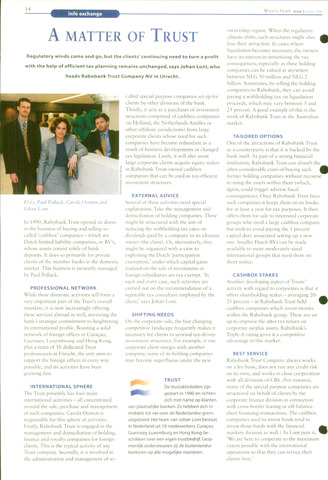A MATTER OF TRUST
14
info exchange
WHAT'S NewS Issue 5 May 1996
Regulatory winds come and go, but the clients' continuing need to turn a profit
with the help of efficiënt tax planning remains unchanged, says Johan Lont, who
heads Rabobank Trust Company NV in Utrecht.
F.l.t.r. Paul Pollack, Carola Oomen and
Johan Lont.
In 1990, Rabobank Trust opened its doors
in the business of buying and selling so-
called 'cashbox' companies - which are
Dutch limited liability companies, or BV's,
whose assets consist solely of bank
deposits. It does so primarily for private
clients of the member banks in the domestic
market. This business is presently managed
by Paul Pollack.
PROFESSIONAL NETWORK
While these domestic activities still form a
very important part of the Trust's overall
mandate, it is now increasingly offering
these services abroad as well, mirroring the
bank's strategie commitment to heightening
its international profile. Boasting a solid
network of foreign offices in Curagao,
Guernsey, Luxembourg and Hong Kong,
plus a team of 18 dedicated Trust
professionals in Utrecht, the unit aims to
support the foreign offices in every way
possible, and its activities have been
growing fast.
INTERNATIONAL SPHERE
The Trust presently has four main
international activities - all concentrated
around the sale, purchase and management
of such companies. Carola Oomen is
responsible for this sphere of activities.
Pirstly, Rabobank Trust is engaged in the
management and domiciliation of holding,
finance and royalty companies for foreign
clients. This is the typical activity of any
Trust company. Secondly, it is involved in
the administration and management of so-
called special purpose companies set up for
clients by other divisions of the bank.
Thirdly, it acts as a purchaser of investment
structures comprised of cashbox companies
(in Holland, the Netherlands Antilles or
other offshore jurisdictions) from large
corporate clients whose need for such
companies have become redundant as a
result of business developments or changed
tax legislation. Lastly, it will also assist
large corporate clients acquire equitv stakes
in Rabobank Trust-owned cashbox
companies that can be used as tax-efficient
investment structures.
EXTERNAL ADVICE
Several of these activities need special
explanation. Take the management and
domiciliation of holding companies. These
might be structured with the aim of
reducing the withholding tax rates on
dividends paid by a company to its ultimate
owner (the cliënt). Or, alternatively, they
might be organized with a view to
exploiting the Dutch 'participation
exemption,' under which capital gains
realized on the sale of investments in
foreign subsidiaries are tax exempt. 'In
each and every case, such activities are
carried out on the recommendation of a
reputable tax consultant employed by the
cliënt,' says Johan Lont.
SHIFTING NEEDS
On the corporate side, the fast-changing
competitive landscape frequently makes it
necessary for clients to unwind tax-driven
investment structures. For example, if one
corporate cliënt merges with another
company, some of its holding companies
may become superfluous under the new
TRUST
De trustaktiviteiten zijn
gestart in 1990 en richten
zich met name op klanten
van plaatselijke banken. Ze hebben zich in
middels tot ver over de Nederlandse grens
uitgebreid. Het team van Johan Lont bestaat
in Nederland uit 18 medewerkers.Cura^ao,
Guernsey, Luxemburg en Hong Kong be
schikken overeen eigen trustbedrijf.Geza
menlijk ondersteunen zij de buitenlandse
kantoren op alle mogelijke manieren.
ownership regime. When the regulatory
climate shifts, such structures might also
lose their attraction. In cases where
liquidation becomes necessary, the owners
have an interest in minimizing the tax
consequences, especially as these holding
companies can be valued at anywhere
between NLG 50 million and NLG 2
billion. Sometimes, by selling the holding
companies to Rabobank, they can avoid
paying a withholding tax on liquidation
proceeds, which may vary between 5 and
25 percent. A good example of this is the
work of Rabobank Trust in the Australian
market.
TAILORED OPTIONS
One of the attractions of Rabobank Trust
as a counterparty is that it is backed by the
bank itself. As part of a strong financial
institution, Rabobank Trust can absorb the
often considerable costs of buying such
former holding companies without recourse
to using the assets within them (which,
again, could trigger adverse fiscal
consequences). Once Rabobank Trust buys
such companies it keeps them on its books
for at least a year for tax purposes. It then
offers them for sale to interested corporate
groups who need a large cashbox company
but wish to avoid paying the 1 percent
capital duty associated setting up a new
one. Smaller Dutch BVs can be made
available to more moderately-sized
international groups that need them on
short notice.
CASHBOX STAKES
Another developing aspect of Trusts'
activity with regard to corporates is that it
offers shareholding stakes - averaging 20-
25 percent - in Rabobank Trust-held
cashbox companies which invest monies
within the Rabobank group. These are set
up to improve the after-tax return on
corporate surplus assets. Rabobank's
Triple-A rating gives it a competitive
advantage in this market.
BEST SERVICE
Rabobank Trust Company always works
on a fee basis, does not run any credit risk
on its own, and works in close cooperation
with all divisions of CBS. (For instance,
many of the special purpose companies are
structured on behalf of clients by the
corporate finance division in connection
with cross-border leasing or off-balance-
sheet financing transactions. The cashbox
companies used to invest funds tend to
invest those funds with the financial
markets division as well.) As Lont puts it,
'We are here to cooperate to the maximum
extent possible with the international
operations so that they can service their
clients best.'

